When you hear about energy drinks you’ll typically think of Red Bull. It is easily one of the most popular brands out there.
However, like most energy drinks, Red Bull is guilty of the some of the same shortcomings that most energy drink brands face, especially in the wake of this information age, where no knowledge is beyond our reach.
Which brings us to today’s topic, which is Red Bull Nutrition Facts.
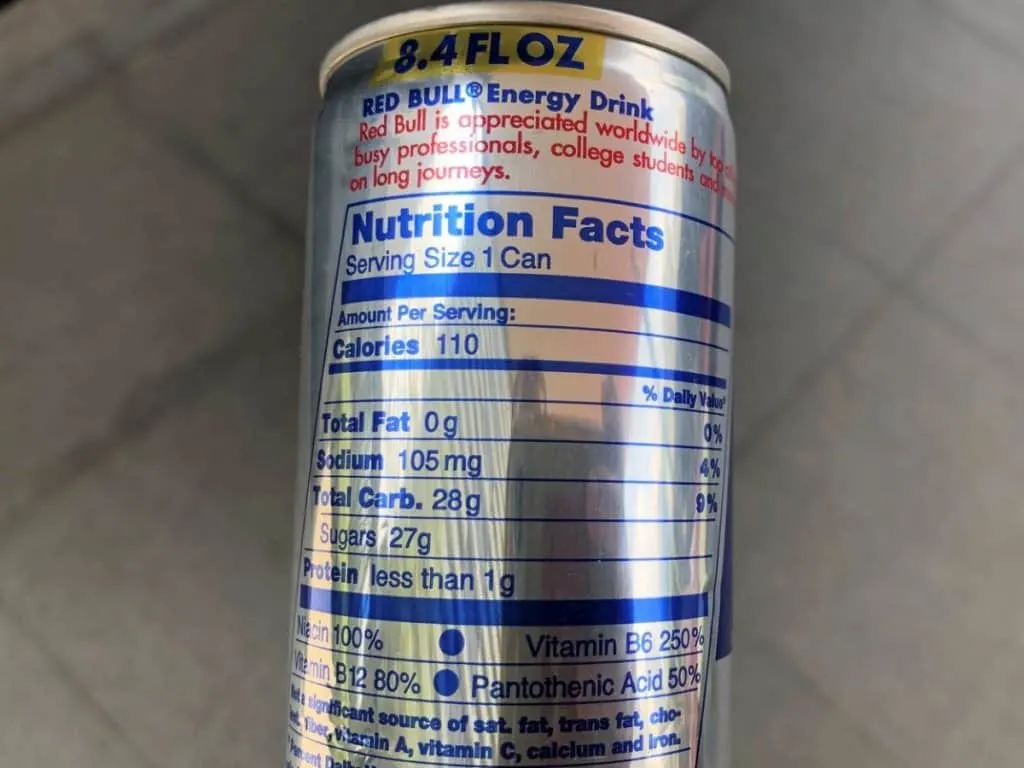
I’ve broken down Red Bull’s ingredients in the previous Red Bull article and how they work to “vitalize” your mind and body, but today we’re only going to talk about the nutrition label, and the juicy secrets they may reveal:
- total fat
- total calories
- total sodium
- total carbohydrates
- added sugars
- vitamins
To cut a long story short, I have found that Red Bull has a high amount of sugar, and an excess of vitamin B6, which may possibly cause a vitamin overdose and result in a variety of unpleasant symptoms and side effects.
If you want to learn more about these issues, as well as other nutrition facts relating to Red Bull energy drink, read on.
Contents
Red Bull Energy Drink Nutrition Facts
When we talk about nutrition, we’re actually only talking about the nutrition label, which all food products are required to have at the back of their packaging as decreed by each country’s food safety administration.
Nutrition labels are important, because number 1, they protect us from making terrible health choices, and number 2, they expose the product for what it truly is for better or worse (usually the latter).
The following table presents Red Bull’s complete nutrition label as it is displayed on the back of the can, with further explanations of what each of them mean further down below.
| Typical Values | Red Bull (8.4 fl.oz) |
| Calories | 110 |
| Total Fat | 0g |
| Sodium | 105mg |
| Total Carb. | 28g |
| Sugars | 27g |
| Protein | Less than 1g |
| Niacin | 100% |
| Vitamin B6 | 250% |
| Vitamin B12 | 80% |
| Pantothenic Acid | 50% |
Calories in Red Bull Energy Drink
An 8.4 fl.oz can of Red Bull a total of 110 calories.
The recommended daily calorie intake for full grown adults is between 2000 to 3000, so Red Bull is relatively safe if you’re currently watching your weight.
However, you may need to factor in the meals you consume throughout the day as well or any other energy drinks, supplements or snacks as those can quickly add up if you’re not careful.
Knowing how many calories a drink has is crucial since it’s a way for you to determine how much energy you consume and use daily. Without knowing the energy you consume, you might eat and drink more than you burn.
This can lead to excess energy which is stored as fat which can add more inches to your waist, which is not what you want.
Total Fat in Red Bull Energy Drink
A can of Red Bull has zero grams of fat. Zero.
You may be wondering why I didn’t just end my sentence there. Well, it’s not as simple as you might think.
We all know that excess sugar can contribute to weight gain but did you know that it is actually the calories you consume, and not the food itself, are stored as fat?
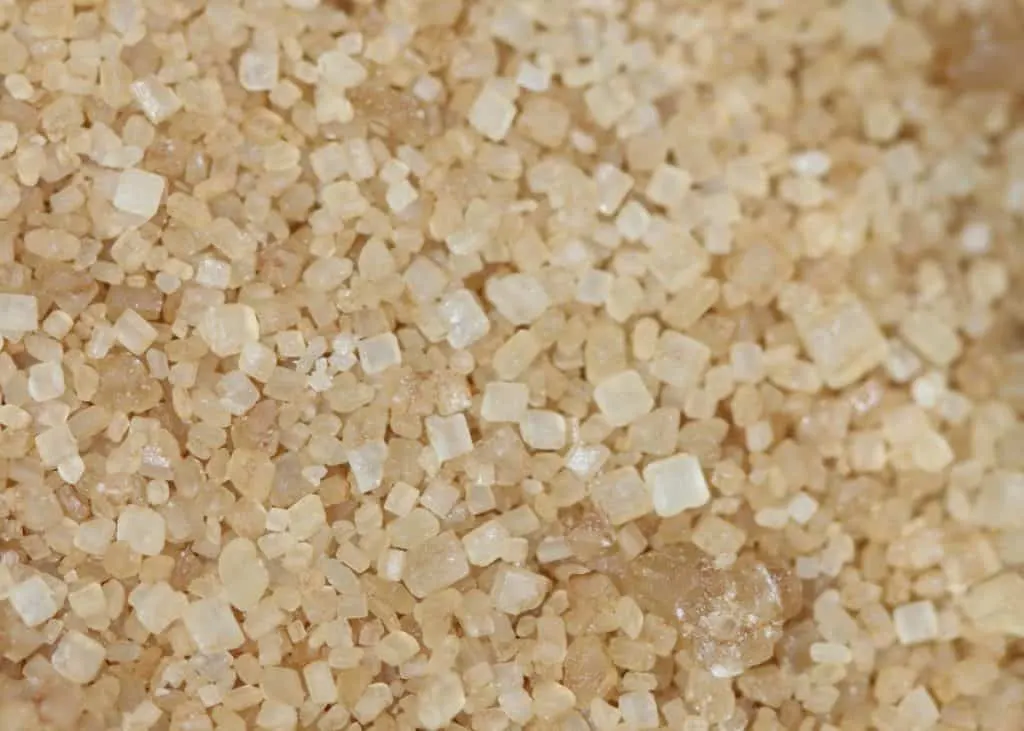
Sugars, carbohydrates, proteins, and yes even fat itself, have a certain amount of calories which is a unit of energy released when food is digested.
Even if you eat a fat-free tub of ice-cream, as long as the nutrition label says the product has got calories in it, there is still a high chance that you will gain some weight, especially if you don’t use up those calories.
In the case of Red Bull for instance, there may not be any fat, but the drink still has a fair amount of calories. So if you don’t exercise those calories away, they will eventually become extra inches around your waist that you don’t need.
Sodium Content Red Bull Energy Drink
A can of Red Bull has a total of 105 grams of sodium which accounts for only 5% of your daily sodium needs, which isn’t that terrible.
Your body needs sodium to maintain its blood volume and pressure. It is also important for maintaining muscle and nerve function.
The recommended sodium intake for adults is no more than 2300 mg, which is equivalent to 1 teaspoon. However, a lot of people exceed this amount, which is why heart disease is the number one cause of death in the world.
Hypertension, which you have probably heard of, is the result of a high-sodium diet. This condition can cause various diseases such as heart attacks and stroke.
While Red Bull does not have a high amount of sodium, you should probably avoid it if you already suffer from high blood pressure.
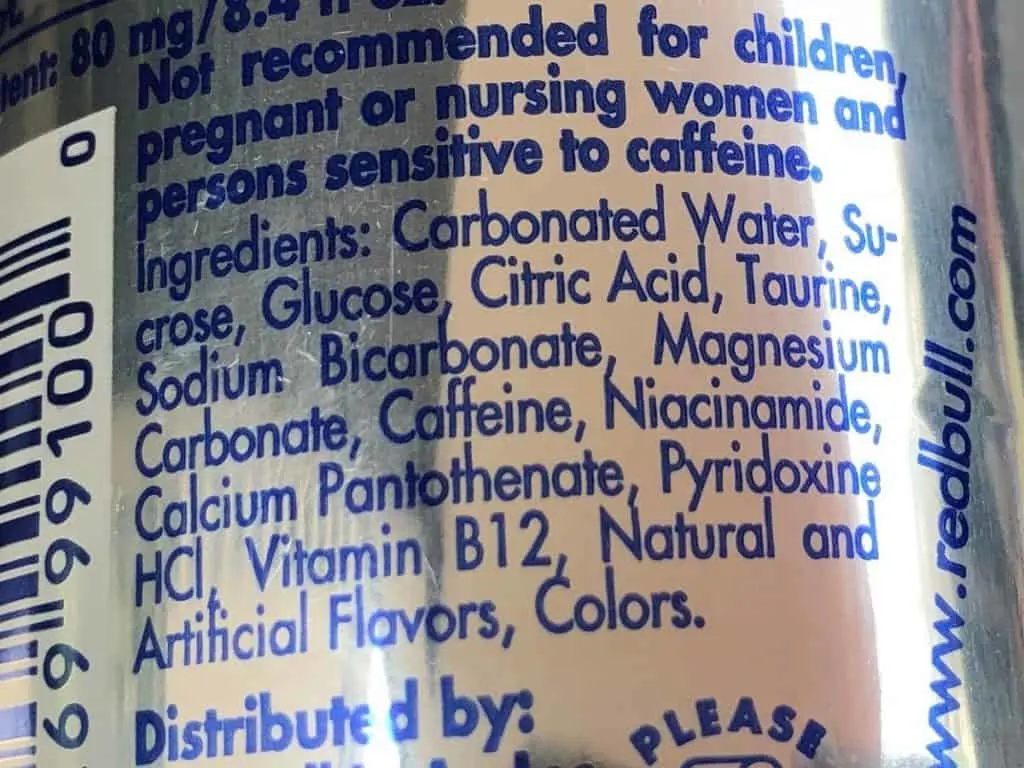
Carbohydrates in Red Bull Energy Drink
A can of Red Bull contains 28g of total carbohydrates which accounts for only 9% of your Daily Value (or recommended daily intake), which is pretty okay in my opinion.
Carbohydrates should take up between 900 to 1300 calories out of the 2000 you consume in a day, which equals 225 to 325 grams of carbohydrates a day.
A can of Red Bull supplies only a fraction of that amount, so it’s fine if you enjoy a can or two a day if you must, but be sure to take into account the extra carbs you may consuming throughout the day in the form of meals and beverages.
However, this may be something that you’ve overlooked
28g of carbohydrates is indeed small, if you’re only calculating your carb intake. But notice how they failed to put the daily value of sugar on the nutrition label, which is where the danger truly starts.
If you do the math, 27 grams of sugar is approximately 75% of your daily recommended sugar intake.
If you’re drinking Red Bull regularly, you should limit whatever sweet things you may enjoy eating throughout the day, because one can is enough sugar to last you for 12 hours at least in my opinion.
Added Sugars in Red Bull
The sugar content of Red Bull is 27g, which is pretty high for an energy drink.
The sugar content in Red Bull primarily comes in the form of glucose and sucrose, which are simple sugars that your body needs for energy.
Because these are simple sugars, they are digested immediately by your body so you’ll get a sharp spike in your blood sugar, which gives you a temporary energy boost.
Sugar has a lot of negative effects, but why do we seem to love it? The answer to that can be understood by what Professor Susanne Klaus (a biologist at the German Institute of Human Nutrition in Potsdam) said, she indicated that our craving for sweet foods are inborn.
Experiments have shown that the combination of sugar and fat is especially effective in stimulating the brain’s reward system,” Klaus says. That mechanism may well play a role in our fondness for chocolate and other sweets
Why Do We Love Sugar?
How Much Sugar Is Okay?
The American Heart Association suggests that an individual shouldn’t consume more than 36 grams or 150 calories of added sugar per day.
That means that one can of Red Bull is enough for a day. That said, you shouldn’t be drinking it every day either!
Unfortunately, most energy drinks contain an absurd about of sugar. If you’ve read my other articles, you know that I’ve mentioned how bad sugar is for you.
Aside from increasing your risk of developing diabetes, sugar is also the number one cause of abdominal fat, cardiovascular disease and cancer.
Its important to make some wise choices regarding your health when it comes to sugar, especially if you’re a fan of energy drinks like Red Bull.
Either limit your intake or lead a more active lifestyle to make up for the insane amount of sugar you put into your body.
Want to know more about how many sugar are there in different beverages? Here’s a video and you may be in shock to see how much sugar you’re consuming!
Vitamins in Red Bull Energy Drink
We’ve talked about the other nutrition contents primarily in terms of grams, but when we talk about vitamins, it is always the norm to use “Daily Value” as a form of measurement, especially since that’s how nutrition labels have always worked.
The daily values (or daily recommended intake) of only four vitamins were listed in the nutrition label. These include vitamin B6, vitamin B12, niacin and pantothenic acid.
We will talk about what each vitamin does for your body and how much of each vitamin is needed to be effective, and how much is too much for you.
Vitamin B6
The amount of Vitamin B6 in a can of Red Bull fulfills a whopping 250% of your percent daily value.
This exceeds the standard 100%, but Red Bull does not address for what purpose this amount is used or what benefits a drinker may gain.
You may be wondering why there’s an absurd amount of vitamin B6 in a can of Red Bull. Funny enough, a lot of energy drinks contain a lot of vitamin B6.
While vitamin overdose is rare, you have a higher chance of overdosing on certain types of vitamins than others, especially with frequent, long-term consumption.
According to this article, a vitamin B6 overdose can result in nausea, heartburn, photosensitivity, skin lesions and severe neurological symptoms.
Due to the overabundance of vitamin B6 in Red Bull, I don’t recommend you drink more than one can a day, and you definitely shouldn’t be drinking it everyday either.
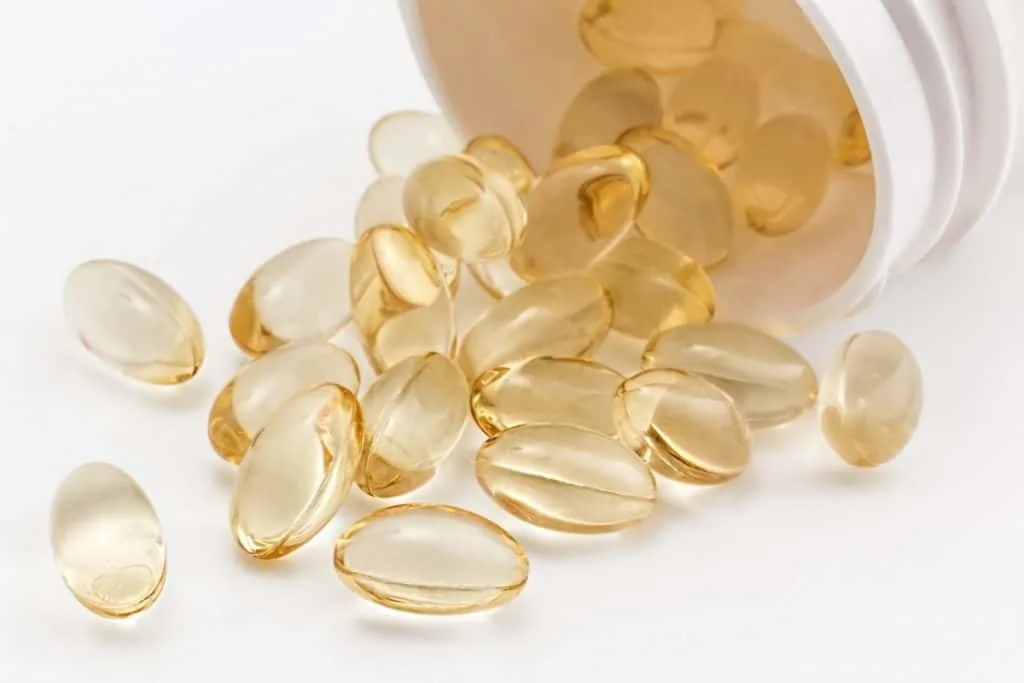
Vitamin B12
The amount of Vitamin B12 in a can of Red Bull fulfills 80% of your percent daily value. Since that amount does not exceed the daily 100% limit, then I would say it’s a safe amount.
As I have mentioned in the previous Red Bull article, vitamin B12, like all B vitamins assist with the energy production and metabolic processes of the body aside from generating healthy new red blood cells.
While it does support your body’s ability to convert food into energy, there is absolutely no benefit to taking extra vitamin B12 for extra energy unless you’re deficient.
Niacin
Also known as vitamin B3, niacin plays an important role in controlling and improving cholesterol levels. A single can of Red Bull supplies 100% of your percent daily value of niacin.
While vitamin overdoses are rare, when consumed in doses of 1-3 grams a day or niacin, or higher, you may likely experience a vitamin B3 overdose.
Some symptoms associated with a vitamin B3 overdose includes impaired vision, high blood pressure, liver damage, abdominal pain, impaired vision, and liver damage
So if you’re worried about any of these symptoms, you should not take more than one can of Red Bull a day.
Pantothenic Acid
Also known as vitamin B5, pantothenic acid assist in the breakdown of carbohydrates, proteins and fats into usable energy and for building bones, muscles and tissues.
Like vitamin B12, it also assists in creating new red blood cells and converting food into glucose.
The amount of vitamin B5 in a can of Red Bull fufills 50% of your percent daily value, which does not exceed the daily limit so it is well within the safety limit.
What are the unhealthy ingredients in Red Bull?
Caffeine and sugar are the two most harmful chemicals in a can of Red Bull, so if you like the energy boost it provides, you’re already well on your way to avoiding them.
The majority of energy drinks include a lot of sugar, usually in the form of high fructose corn syrup. Consuming an excessive amount of sugar raises the risk of developing diabetes and obesity, both of which are precursors to more major health problems.
What does Red Bull do to your heart?
Atrial fibrillation is a kind of irregular heartbeat that occurs in the chambers of the heart, and studies suggest that drinking certain beverages such as Red Bull may increase the risk of developing the illness.
Specifically, caffeine, the major component in Red Bull, causes the body to produce more of the stress hormone at rest, which raises blood pressure. Hence, research has shown that consuming Red Bull may either increase or decrease heart rate.
Conclusion
Based on the nutrition facts, Red Bull has 110 calories, 0 g of total fat, 105 mg of sodium, 28 g of total carbohydrates, 27 g of sugars, less than 1 g of protein, 100% of niacin, 250% of vitamin B6, 80% of vitamin B12, and 50% of pantothenic acid.
Aside from the sugar, I would say another serious red flag is the vitamin B6, which supplies an excessive amount in a single serving.
I have highlighted the potential risks of overdosing on vitamin B6, so that’s something you should think about before chugging more than one can of Red Bull in a single day, or even multiple times in a week.
I’m afraid it is often the case that sugar and vitamins are the cause of the downfall of most energy drinks, so this comes as no surprise.
Nevertheless, it is a good thing that nutrition labels are mandatory, otherwise, we would be stumbling in the dark unaware of what ghastly things we put into our bodies.
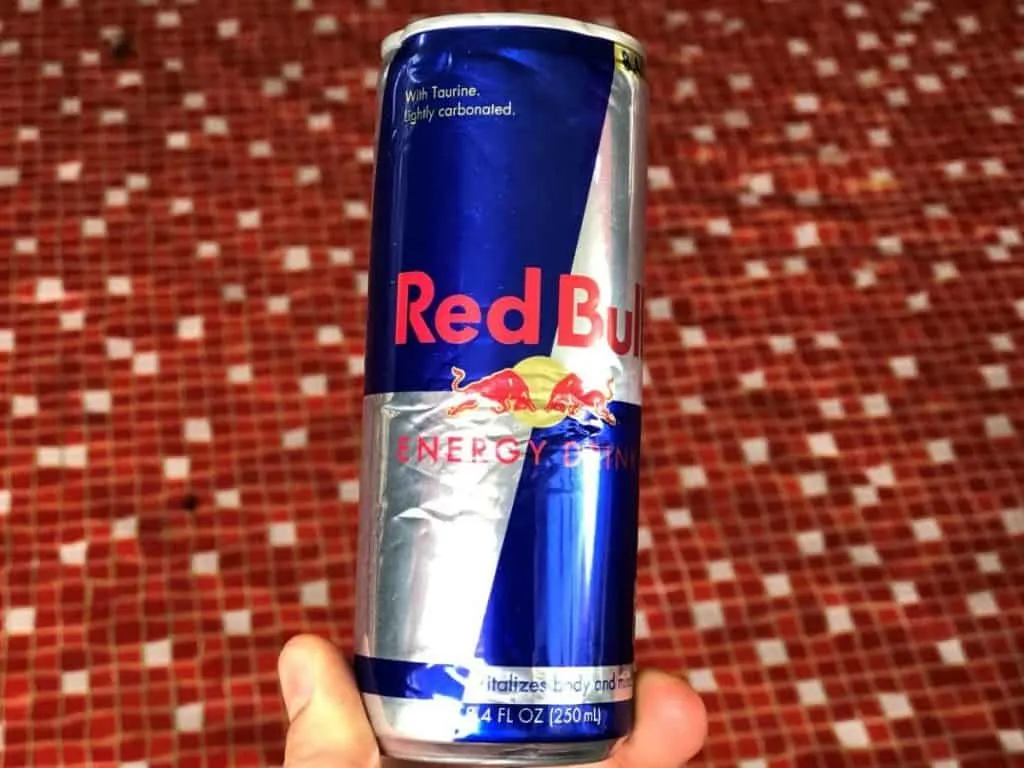
Nutrition labels are designed to protect end consumers. They serve an important purpose but are often overlooked, simply because not many people know how to properly read them.
I have broken down the nutrition facts of Red Bull so that you can be a little more informed than you were a few moments ago.
Hopefully this article can fill in a few blanks for you and help make you more aware of how nutrition labels work and how they can help you shape a better, healthier lifestyle.
